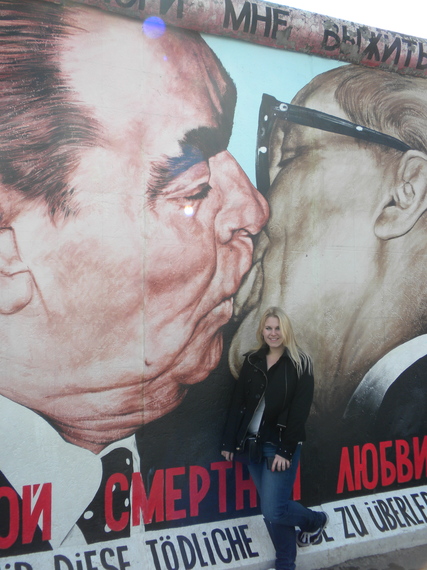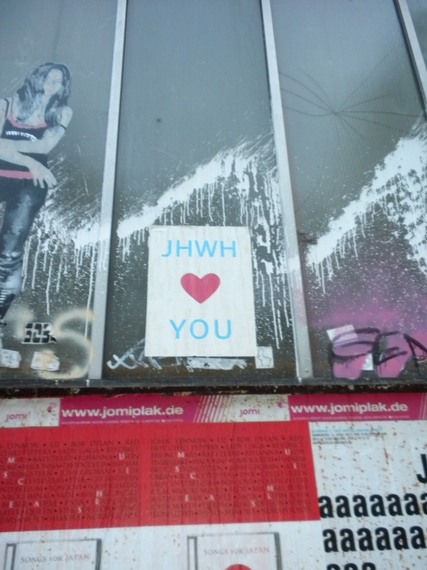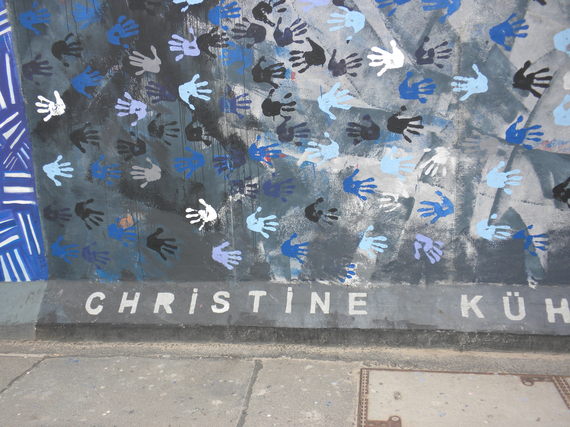This is an excerpt from the longer essay, "Schöneberg‐Mitte‐Kreuzberg," the travel nonfiction on Berlin, its cool kids and the lines, labels and parenthesis that come with them.
Amador's directions read to get on the U‐bahn to Alexanderplatz then switch to the U2 line, head toward Ruhleban and get off at Bülowstrasse. His dense letter gave confidence, though he did admit that he didn't know his own address. What drew me to Berlin, I don't know -- the city was a secret I wasn't in on. After navigating through Amador's prose I found myself at a red brick Protestant church in the Schöneberg district, in the swell of reunion, looking at his big remembered mouth.
I hadn't seen him for a few years. At first, I felt more different than he seemed different to me. We both grew up in southern California, and we lived outside of that insular and privileged‐to‐a‐fault peninsula for sometime now. Not fully conscious of it then, but we still carried that privilege. (I wouldn't say you lose it.)
"Schöneberg is like gay men and eighties mustaches," he said as we returned to the U‐bahn. The Weimar Republic teamed up in the neighborhood to make a hotspot, but as early as 1933 the Nazis began to shut down nightclubs like the Eldorado. Amador said he
never went to clubs, though there's a fraught sexiness of the city applied across orientation lines.
I noticed pictures of his boyfriend around his small studio apartment -- he had different investments in the city: to study theater in Berlin, to become neighbors with ghosts of buzzing bohemians like Christopher Isherwood. (Christopher Isherwood wrote Goodbye to Berlin, which was later adapted into the musical Cabaret, a play our high school performed when Amador and I both went there.)
In high school, we only saw a spotlight, playing characters on stage or out in parking lots. And now, the silly way Amador and I talked to one another -- panting dogs over a bell -- was an dislodged memory. The teenage, orthodontic girl released into the church air, a remembered toll. How Berlin rattled an old self out of me. I was seized in this city and acknowledged out loud something, unbeknownst to me, was a social no‐no.
We were walking through his neighborhood, and like a real mouth‐breather I said, "this is so cool," ogling at everything and nothing in particular. It was then that I noticed Amador to be different, nodding his head and possessing that mouth of his: the way it leaned to the right. The weight to one side was like a hip waiting for a train on the platform.
Berlin was inherently cool. And I couldn't even tell you how cool it was or why it was cool. The people there were just cool because they'd never talk about how cool the city was or how cool it was to live there. But cool as a socio-economic factor was definitely on the radar. They saw the blip but never said out loud, "We try hard, right?" (There was always that proverbial elephant there-- wearing his proverbial lederhosen.)
And, probably what made it seem so cool was that I wasn't a part of this silent conversation. The utterance separated me.
(Yes, the lot out there says Berlin isn't cool anymore. That it was cool 15 minutes ago and you just missed the train. Now it's Budapest and it's always been Budapest. So what David Foster Wallace's Infinite Jest was just performed throughout Berlin in different locations over 24 hours? I don't care if that's what a person deems something to be, but more interested in why a person is saying that in the first place. Is cool consensus or just the opposite?)
I used the Bülowstrasse stop every morning, docile and quiet compared to its contentious past. First named after the Prussian General, it had to be rebuilt after World War II air raids in the Battle of Berlin. For decades the U2 line was completely interrupted because of the construction of the Berlin Wall. It wasn't until 1993 when the U2 line finally hinged East and West Berlin back together.
The city functioned outside my small understanding of the hurdy gurdy. I had shallow understanding of the maps. There were rules that everyone knew. Berlin was a wunderplatz --so competent with an honor code to always pay for your ticket and a commitment to be polite and keep to yourself on the train.
The Berlin Wall did more than cleave the city: Americans, Brits and the French to the West and Stalin's Soviet to the East. Political lines drawn: that is explicit. You became free or not free because of the side you happened upon or what neighborhood you thought would be best to raise a family. It was a scary circumstance to believe a label on your life was mere geography and a thick red pen. The memory of the wall-- even its crumbling in 1989-- was far too recent to forget.
My dental hygienist back in California lived in West Berlin as a teenager because her father was in the United States Army. She said the train that took West Berliners out of the city cut through parts of East Berlin. (I realize to call a person from Berlin a "Berliner" is also calling them a type of donut. But I'm doing it nonetheless.)
On the train, she'd stick her face up against the closed window and wave to the citizens on the East side. They never waved back -- that was too loud a gesture. She remembered catching the eye of an older gentleman in hopes of getting his attention. As the train slowed down by a platform and then began to pick up speed again, he winked.
I'm not sure what year that would have been and how that would have changed her route -- it is difficult to track the U‐bahn and S‐bahn stations when The Wall was up. Perhaps it was Friedrichstrasse S‐Bahn station, a border clearance for the West and the East. I think she might have been too young, if she was even born at that point, since the border was sealed in 1961. (The station was deemed "Tränenpalast" or Palace of Tears because of the countless farewells it witnessed until 1989.)
In the dentist chair, the blinding light in my mouth, my dental hygienist scrapped the tops of my teeth, curving the mini‐scythe up against my gums: "But it probably saved my grandparents' marriage. My grandpa's mistress lived on the East Side, so that ended easily."
Berlin never forgot to label. Even after the Wall came down, the city returned to storing itself into compartments. I only realized that when passing through the cracks of the shell, the borders, wedging my way into the neighborhoods. Stepping through the labels was the only way to understand the city because Berlin wasn't what the Jews might say tacheles, or straight talking.
In Mitte, like a tourist, I spent the greater part of daylight getting learned and weepy in multiple Holocaust museums hearing stories and seeing footage that took me out of my body. Then I lost myself in the memorial made labyrinthine, caught between high and low rectangles where sound escaped shortly from my mouth. Blocks later, I stood at Check Point Charlie, where democracy once faced off with the Soviets. The man I gave coins to immediately knew I was American and said, "the brown ones aren't worth anything."
I stood in a dusty and dishonorable reverted parking lot--the death‐place where Adolf Hitler was torched. A place rightfully not given a second thought.
And all I could think of was how much I wanted Mustafa's again. (Find it. Eat it.)
I didn't know I had already been to Kreuzberg. My Deutsch sprechend friend took us to the food cart off of the Mehringdamm stop. People lined down the block for Mustafa's which was not just a doner kebab but a doner kebab that came down to save all the other doner kebabs from their sins. Currywurst was across the street so we ping‐ponged back and forth to keep our spot in line. I ate more Turkish food in Berlin than I did German food because the city had always been about usurpation, like the occupation that carved into the meat of the city.
By 1990, Berlin's gray was taken over by pigment that devoured the wall. In Technicolor, two old politicos man‐kissed: The Fall of Soviet Empire. The hunger to take over the city didn't stop at the East Side Gallery.
Artists flooded the sides of old department stores, conjuring figments to crawl up the sides: Sazo's flesh‐colored giant: a puzzle made up of newborn babes. Even something so prosaic on the side of a tavern alley -- the shadow of a young woman sprayed along the way. (Sazo is a graffiti street artist. It is difficult to find empirical research on the subject probably because graffiti artists don't make themselves too public on the matter.)
We infiltrated Kunsthaus Tacheles, a fecund artist community, once a Nazi prison, where the side of the storied building read, "How long is now?"
The city always felt new and it never wasted the moment to take from under. Artist communities were on top of themselves -- on the brink of being run down, then fresh, then overly ripe again. Berlin's licentiousness was justified in its decision for a sculpture garden, to paint and redden metals for sale in a dilapidated building.
The city revealed another side to its worship on my pilgrimage from Watergate back to Schöneberg. (Watergate is a nightclub on the Spree, "known for the wall‐to‐wall LED light installation and its impeccable music policy". The oxygen provided is mainly second‐hand smoke, but the haus music and dancing is worth it -- along with the view of the sun rising over the river.)
I spent the night with Club‐Mate and Vodka (try it sometime), dancing till the sun rose upon the Spree where I breathed the fumes of house tracks.
For breakfast, my teeth cut through Turkish delight, a rose jelly, and I managed my way into morning reading boarded up buildings plastered with "JHWH
Caitlin had been going to an American school in Berlin and living in Kreuzberg for almost a year. She had a sleight hold over German. We knew each other from our hometown where we did community service for a charity league for six years. As we graduated from high school we essentially had a debutante presentation, though probably many would never use such a telling word (even when we were walking down an aisle in white dresses).
We met up at the East Side Gallery, a couple blocks from her apartment and then she took me to her favorite falafel place. She embodied a side to the Kreuzberg community: the white, the cool, and the nonchalant.
She went to concerts multiple times a week and wrote a few music blog posts for NPR Berlin. As we finished our falafel I bought a Club Mate, a cheap and highly caffeinated soda tea.
"The city runs off of this," she said, so I bought even more into the trend. A total sap I was, especially later that night when a lanky besweatered DJ in the Prinz‐Albrecht‐Strasse District (now Niederkirchner Strasse) flashed his clear eyes and poured more into my glass. It was an endorsement that stuck.
(Other endorsements from a blogger read: "tiredness after heavy work disappears in a miraculous way after one sip of maté. And that's not all, Club‐Mate is the "ideal slimming drink once it facilitates weight loss and suppresses hunger and thirst.")
(In another blog post entitled "10‐signs‐youve‐become‐a‐berlin‐hipster" one blogger wrote, "One of the best things about Club‐Mate, and which also explains the widespread success of this drink, is the price. All this goodness comes for around €1.50 a bottle and it can be found at any decent Spaetkauf, or cornershop, and supermarkets around Berlin.")
As Caitlin and I wandered and drank through Kreuzberg, it was as if we changed in the eyes of the neighborhood. Maybe I wasn't the observer I thought I was. The passing dark faces read me differently than the Germans read me. Though I wasn't the hipster, distinct and separate from the Turkish Community, I was closer to that elite minority than the actual minority in the minority neighborhood. I saw the divide. We bought the Club‐Mate from a Turkish man who was behind the counter. In the 1970s, the Turks came to Berlin as "Gastarbeiter", or guest workers.
(I couldn't help but think of the similarities between the Turks in Berlin and the Mexicans in California. However, many of the second or third generations are not citizens because German citizenship is based on blood and a difficult naturalization process.)
At the Türkenmarkt we swiveled our way through the hive of proprietors, free green‐eyed ladies behind hijabs whose olives shriveled my fingers with a look. The vinegar in the air seized my eyes for a moment, and then the candied nuts crystallized the air with sweetness. They shouted over stands calling the names of their friends, keeping up conversation, but got impatient if I browsed or picked up ekmek in my hands.
I wanted a mango, that mango there, but the man behind the fruit and I didn't have voices for each other. Though I wanted that mango, there, the perfect one, before the brink, he took the one I wanted to buy, put it down amongst the pile and before I handed over my Euros, he picked up a lesser mango, the one beside, overly soft and blemished. All I could do was point to the one I wanted, but he insisted it was the same one, thinking I wasn't smart enough for fruit because I didn't know Turkish.
I walked away because my voice couldn't bargain, but I held onto the absence of a mango. My Deutsch sprechend friend wanted to go back and speak curtly, but I just choose quark instead.
I lathered my spoon with the thick sweeten curd and we sat for a moment along the runs of Landwehrkanal as the day dipped. Young blonde faces strolled down the canopied tents on their days off as harlequin musicians, who happened to claim the same stretch of the canal, decidedly scooped their sound into a band. And the bangles were heard half a mile down to the terminus of the market, where the bronzed proprietors could take a great leap beyond their cloistered stands to the hurried passage, the crowd of the weekend.
My spoon was emptied and the light from the Landwehrkanal changed quickly on my friends' faces. To the Berliners, I was neither Turk nor German, but a shade to the city, the body that passed through capricious boundaries. I didn't have a name and I didn't fathom or couldn't recognize that without the vantage. Maybe it was simply tourist.
Berlin was a city of trespass, especially in Kreuzberg, not only for the 300,000, the largest Turkish community in Europe after Turkey itself, but also every passage. Every walking moment there was an intersection. These borders upon borders were welled up layers of city memories, the voices I couldn't even step in on.
Three in the morning, I thought the S‐bahn could take me where the U‐bahn could. I read the maps ignorantly and walked in the pitch for sometime before I hailed a Turkish cab driver where I incorrectly pronounced Bülowstrasse. (I said, "Bull‐o‐straus‐eh". It was a small but significant difference.)
He pushed through multiple neighborhoods taking me elsewhere when I reached for the few expressions I could muster: nein, nein, then wrote my street name down. He turned around and began the digressive ride. When I saw the familiar U‐bahn I said danke before he even stopped.
As I ran back to Amador's apartment in my utter strangeness, a man heard my boots hitting the pavement. In the quiet darkness he bellowed something that swelled across the red church grounds that swooped up my back and down my chest. But the voice was just an incomprehensible sound that mistook me as someone who could comprehend.



